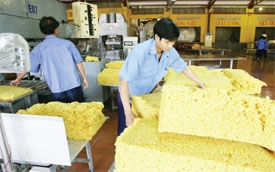India spices up links with Vietnam
 |
| A free trade agreement between India and ASEAN is good news for Vietnamese firms |
India’s ambassador to Vietnam Ranjit Rae delivered this message during the visit of a delegation of 62 Indian enterprises to Vietnam last week.
Led by the Associated Chambers of Commerce and Industry of India and the Federation of Indian Export Organisations, the delegation represented a broad range of sectors including agriculture and food processing, chemicals, construction materials and machinery, handicrafts, electrical equipment, gems and jewellery, lubricant grease and oil, leather, garments and textiles and scientific equipment.
“There is huge potential in Vietnam and Indian companies are looking to identify opportunities,” Rae said.
Indian investment in Vietnam to date stays at a relatively low level. There have been some 51 projects worth some $213 million registered by Indian firms in Vietnam so far.
Last week’s visit by 62 Indian firms was not the only recent sign of Indian interest in Vietnam, other business groups have come to the ASEAN country this year to sniff out business opportunities.
A 40-member delegation from Indian Speciality Chemical Manufacturers Association visited Ho Chi Minh City in mid-March.
The companies involved make organic and industrial chemicals and food additives used in the printing, dyeing, construction, rubber, and food industries. During the visit, over half the Indian chemical manufacturers sought out Vietnamese partners to set up joint ventures in Vietnam.
In the first quarter of this year, Indian Marico acquired an 85 per cent stake in International Consumer Products (ICP), one of the most successful Vietnamese producers of fast moving consumer goods.
In a similar development, India’s Bafna Enterprises kicked off its spice processing company in Vietnam in February. Bafna Enterprises holds a 75 per cent stake in the $5 million joint venture named Unispice. The other stakeholder is a Vietnamese firm.
Unispice will focus on value-added pepper products. Initially, the company will have the capacity to process 500 tonnes of pepper a month. This processing plant is part of Bafna Enterprises’ strategic plan to be in close proximity to raw material supply.
The poor supply of black pepper in India prompted the Indian firm to look for other sources.
Vietnam replaced India as the world’s largest producer and exporter of black pepper in 2000 and produces around 100,000-130,000 tonnes of the spice per year.
Bafna Enterprises is the third major spice exporter from the subcontinent to set up a processing facility in Vietnam in recent times. Vallabhdas Kanji Ltd and Madhu Jayanti International Limited set up processing facilities in Vietnam a few years ago.
Also last week, Indian Exim Bank launched a new scheme offering credit to foreign governments and government-owned entities for executing projects run by Indian companies. The credit will be offered in sectors such as road, housing, building, gas and oil pipelines, power, renewable energy, airports, ports and other infrastructure projects.
“With the new scheme, and with the India-ASEAN Free Trade Agreement, you will see a significant increase in bilateral trade and investment between the two countries in future,” Rae said.
In the first two months of 2011, bilateral trade value between the two countries stood at $643 million, up 59 per cent year-on-year with Vietnam shipping some $175 worth of goods to India.
What the stars mean:
★ Poor ★ ★ Promising ★★★ Good ★★★★ Very good ★★★★★ Exceptional
Related Contents
Latest News
More News
- Hermes joins Long Thanh cargo terminal development (February 04, 2026 | 15:59)
- SCG enhances production and distribution in Vietnam (February 04, 2026 | 08:00)
- UNIVACCO strengthens Asia expansion with Vietnam facility (February 03, 2026 | 08:00)
- Cai Mep Ha Port project wins approval with $1.95bn investment (February 02, 2026 | 16:17)
- Repositioning Vietnam in Asia’s manufacturing race (February 02, 2026 | 16:00)
- Manufacturing growth remains solid in early 2026 (February 02, 2026 | 15:28)
- Navigating venture capital trends across the continent (February 02, 2026 | 14:00)
- Motivations to achieve high growth (February 02, 2026 | 11:00)
- Capacity and regulations among British areas of expertise in IFCs (February 02, 2026 | 09:09)
- Transition underway in German investment across Vietnam (February 02, 2026 | 08:00)

 Tag:
Tag:


















 Mobile Version
Mobile Version